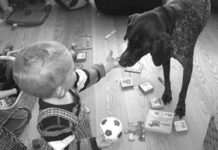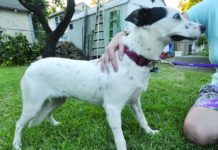How to Help a Dog with Separation Anxiety
Separation anxiety (SA), also known as separation-related distress, is one of the most common behavioral problems in pet dogs with some estimates stating that...
Noise-Phobic Dogs
As unlikely as it sounds, one of the most effective treatments for thunderstorm phobias may be an over-the-counter hormone used by humans to prevent insomnia. Melatonin, produced by the pineal gland, sets the body’s internal clock in response to exposure to light. The body creates melatonin only in total darkness, for the pineal gland stops production when any part of the body, even the back of the leg, is exposed to light. In people, melatonin has been shown to calm the nerves, reduce anxiety, relieve panic disorders, prevent migraine headaches, facilitate deep sleep, and, according to some researchers, help slow the effects of aging.
The Velcro Dog
A “Velcro dog” wants to be where you are, no matter what and no matter where. A dog desiring closeness isn't a bad thing. If it's a symptom of separation anxiety building a dogs confidence can help them be confident when alone. If the behavior is new it can mean the dog is ill or in pain.
Sound Masking to Help Dogs with a Noise Phobia or Sound Sensitivity
Noise canceling with noise machines, music or sounds from a speaker, or even just a circulating fan can help dogs with a noise phobia, or dogs that are scared of thunder relax.
Help For a Dog With Car Phobia
Behavior issues, from simple good manners infractions to the more concerning problems of phobias and aggression, appear in dogs both large and small. But while training to modify behavior issues might look the same regardless of size, in other respects, the bigger the dog, the bigger the problem. When a Dachshund has a lapse in housetraining, the cleanup process is significantly easier than if an Irish Wolfhound has an accident. If a Havanese frantically jumps up on your elderly Aunt Tilly, the collateral damage is less than if a Great Dane does the same. And if a Yorkie is terrified of riding in the car and refuses to get in for an emergency trip to the vet, he can be picked up and placed inside – not so when a Newfoundland steadfastly refuses.
Dog Appeasing Pheromone to Calm Anxious Canine
Our review of a plug-in atomizer that dispenses a “dog appeasing pheromone” to calm especially anxious canines. According to its maker, DAP is supposed to mimic a natural stress-reducing hormone produced by mother dogs while nursing their puppies. It purportedly stops or reduces stress-related barking, urination and defecation, whimpering and whining, anxiety, fear, chewing, and other stress-related behaviors.
Why Do Dogs Suck on Blankets?
We’ve all seen human babies sucking on pacifiers, their thumbs, or even on blankets and child experts tell us that this kind of instinctive sucking calms babies and makes them feel more secure. The same is likely true for dogs who can suffer from anxiety and stress.
Help Your Shy Dog Gain Confidence
he needs more distance between himself and strangers.üCarefully engineer any opportunities for your dog to gain positive experiences with strangers; exploit his love of treats!"
New Recommendation for Fear-Based Behavior Problems
In May, I attended a seminar given by noted veterinary behaviorist Nicholas Dodman, section head and program director of the Animal Behavior Department of Clinical Sciences at the Tufts University Cummings School of Veterinary Medicine. The seminar, “The Well Adjusted Dog: Secrets to Understanding Canine Behavior,” covered a number of behavior problems, including aggression, separation anxiety, phobias, post-traumatic stress disorder, and canine compulsive behavior.
Behavior-Modifying Drugs for Dogs: Medications for treating fear, phobias, and anxiety in dogs
Separation anxiety, aggression, fear of humans, fear of other dogs - though common, these pet behaviors indicate your dog may be suffering on a neuro-chemical level. How anxiety medications work in humans is still a considerable mystery, but we know that some also work on dogs. Can they help YOUR dog live a less stressed life?
Know When Your Dog is Scared
Recently, on the drive home from our annual vacation in Maine, our 11-year-old Brittany, Vinny, suddenly and inexplicably awoke from a sound sleep, and began to tremble, pant, pace, and obsessively lick at the sides of his travel crate. When I crawled back over the seat to find out what was wrong, I observed that Vinny's eyes were squinty
Unsticking Myths About Dogs
apprehensive















